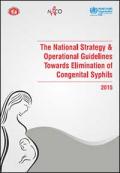Publications - Released in 2015
Syphilis is a systemic, sexually transmitted infection caused by the bacterial spirochaete, Treponema pallidum. If it is not treated adequately in the primary, acute stage, it leads to chronicity and many adverse systemic outcomes.
In more than 50% of cases, untreated syphilis in pregnant women can result in numerous adverse outcomes of pregnancy including stillbirths, premature or low birth weight infants, neonatal deaths or birth of a congenital syphilitic baby. Congenital syphilis is an easily preventable and curable disease, which can be eliminated through effective screening of pregnant women for syphilis and adequate treatment of those infected.
Downloads
Publication(25.62 MB)
Organizations
- National AIDS Control Organisation (NACO)
- World Health Organization (WHO)






